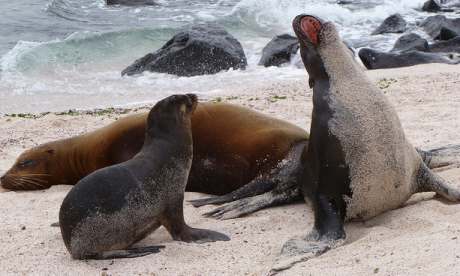
Sea lions, pelicans and in-your-face wildlife in harmony with humans on the Galapagos Islands
When you sail into Puerto Baquerizo Moreno, the provincial capital of the Galápagos, you get some idea of how things might have been if the Garden of Eden had had a seafront. Moored in the harbour are little work boats and dinghies which, in the absence of their rightful owners, are occupied by basking sea lions.
In the local park children share football space with teenage sea lions, brown pelicans hang around the dock like neighbourhood bums, while frigate birds and blue-footed boobies pause for reflection on the prows of fishing boats. A heron sauntered along the waterfront pavement, and I gave it right of way. Ground finches – one of the 13 related Galápagos species which inspired Darwin’s theory of natural selection – bounced around my feet, and in the garden of a guesthouse, a juvenile gang of marine iguanas was taking it easy.
No matter how many books you’ve read or TV documentaries you’ve seen, the extraordinary, in-your-face wildlife of the Galápagos electrifies you with a shock of pleasure. I expected a lot from my first visit, but I didn’t expect these famously fearless residents to be sharing their lives so tolerantly with the human population of the four inhabited islands – and vice versa.
“They all get along pretty well,” said Hernan Barreno, our guide.
Sitting on the glorious beach of Española, while a Galápagos mockingbird teased my camera strap and a sea lion pup flopped into my lap, I coudn’t help asking myself if, despite the efforts of all the many conservation organisations, this age of Galápagos innocence can last indefinitely.
The worst threat comes from the illegal harvesting of the nutrition-rich seas that sustain the marine wildlife in such dense numbers. Those gourmet treats for the Asian palate, sharks’ fins and sea cucumbers, are prized by a ruthless market which has caused such predations within the Galápagos Marine Resources Reserve that in 1998 the Special Law for the Galápagos was established in an attempt to confine fishing to tourism and small-scale local enterprises. The effective policing of the law, however, is beyond the existing resources of the Ecuadorian government.
There are worries, too, about tourism which, on the whole is rigorously controlled and makes a major contribution to conservation funding. “Too big, too big,” muttered Hernan, as we watched the 100-berth Galápagos Princess shuttle its passengers in convoys of pangas to the lava fields of Isabela. Although the tourist cruise ships range in style from converted fishing boats to luxury yachts, few carry more than 20 passengers. Hernan, who is one of the islands’ top guides, believes that greater numbers at any one site not only diminish the experience but make even the most relaxed booby chick or nursing sea lion twitchy.
“It’s also more difficult for the guides to control tourist behaviour,” he said, “and although most visitors are truly respectful of the wildlife there are always a few who behave stupidly or selfishly, if only to get the best possible photographs.”
There are now two ships with an upper limit of 100 passengers cruising the islands, and a third is planned.
“Three too many,” said Hernan. He is less concerned, however, about another innovation: the Royal Palm Resort, the Galápagos’ first resort hotel, which opened in 2001. Only 3% of the archipelago’s land mass is not part of the national park, so the Royal Palm couldn’t really pick a prime site – and it shows.
Stranded on a damp plateau in the drizzly highlands of Santa Cruz, the Royal Palm’s grounds were deserted when we visited its farmhouse restaurant. “It will never work,” predicted Hernan confidently. “The weather’s like this in the highlands for most of the year. You can’t even see the views.”
I have no personal grudge against the ‘crazy Italian’ who ventured his capital on this forlorn enterprise, but I’m happy to believe that Hernan is right.